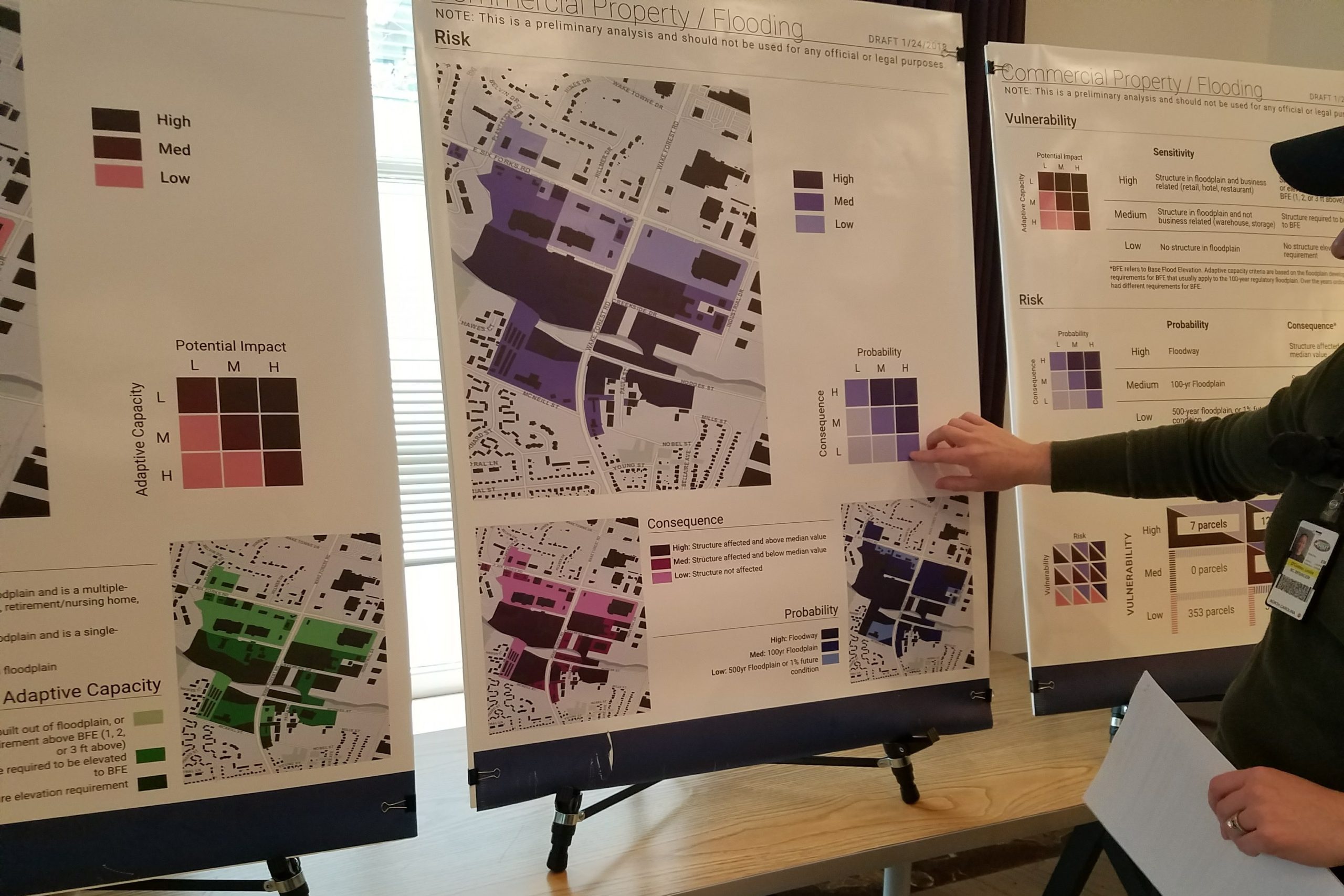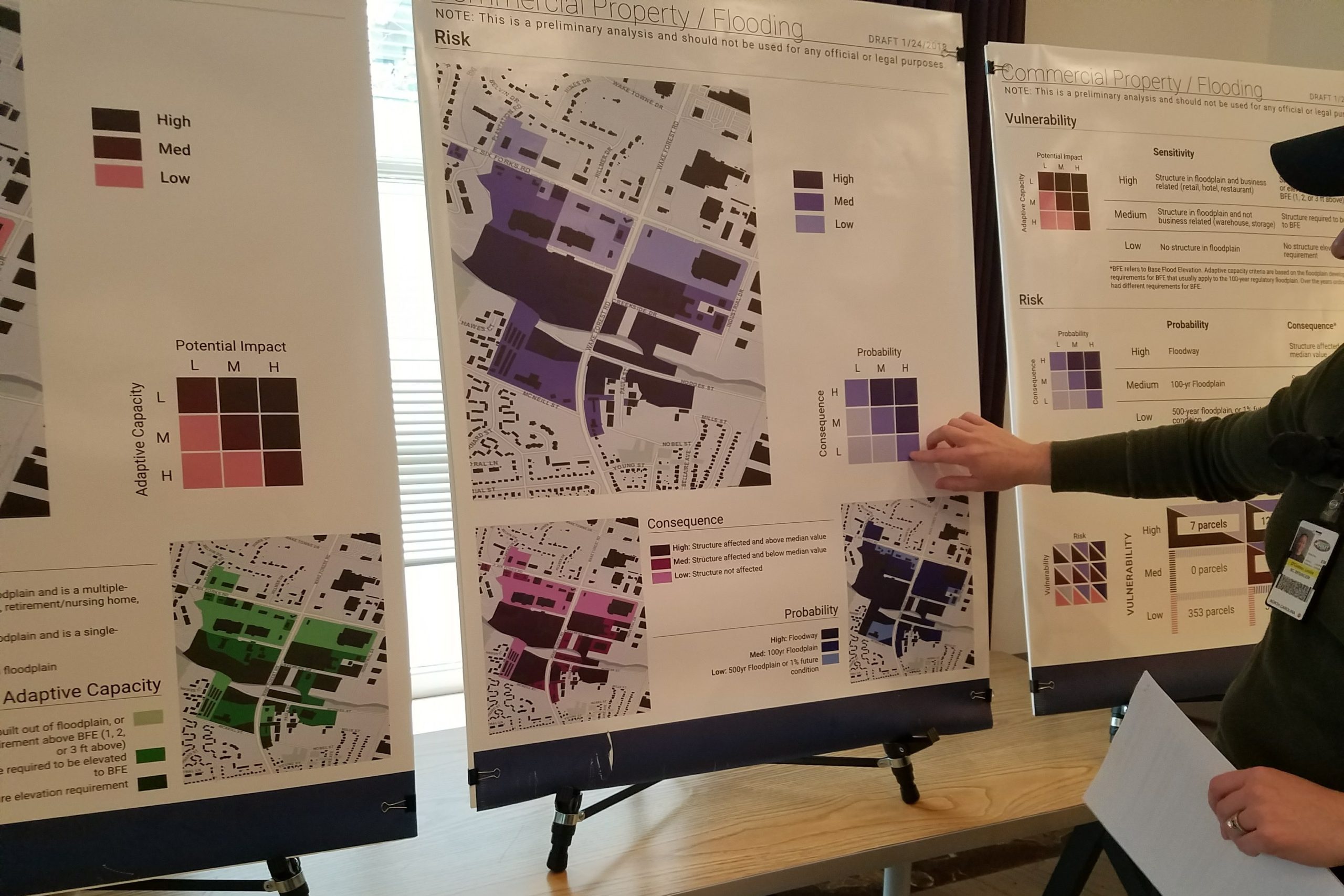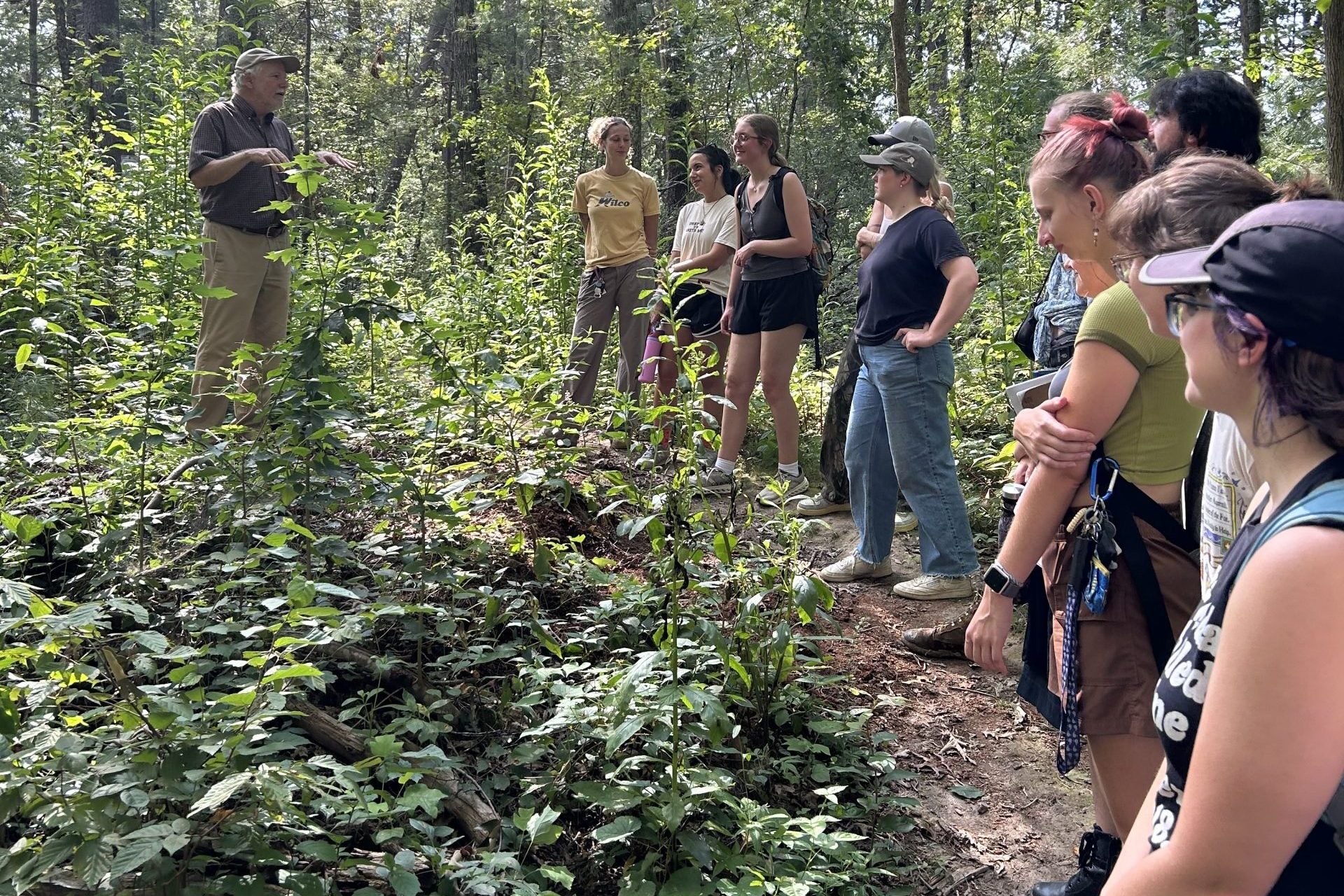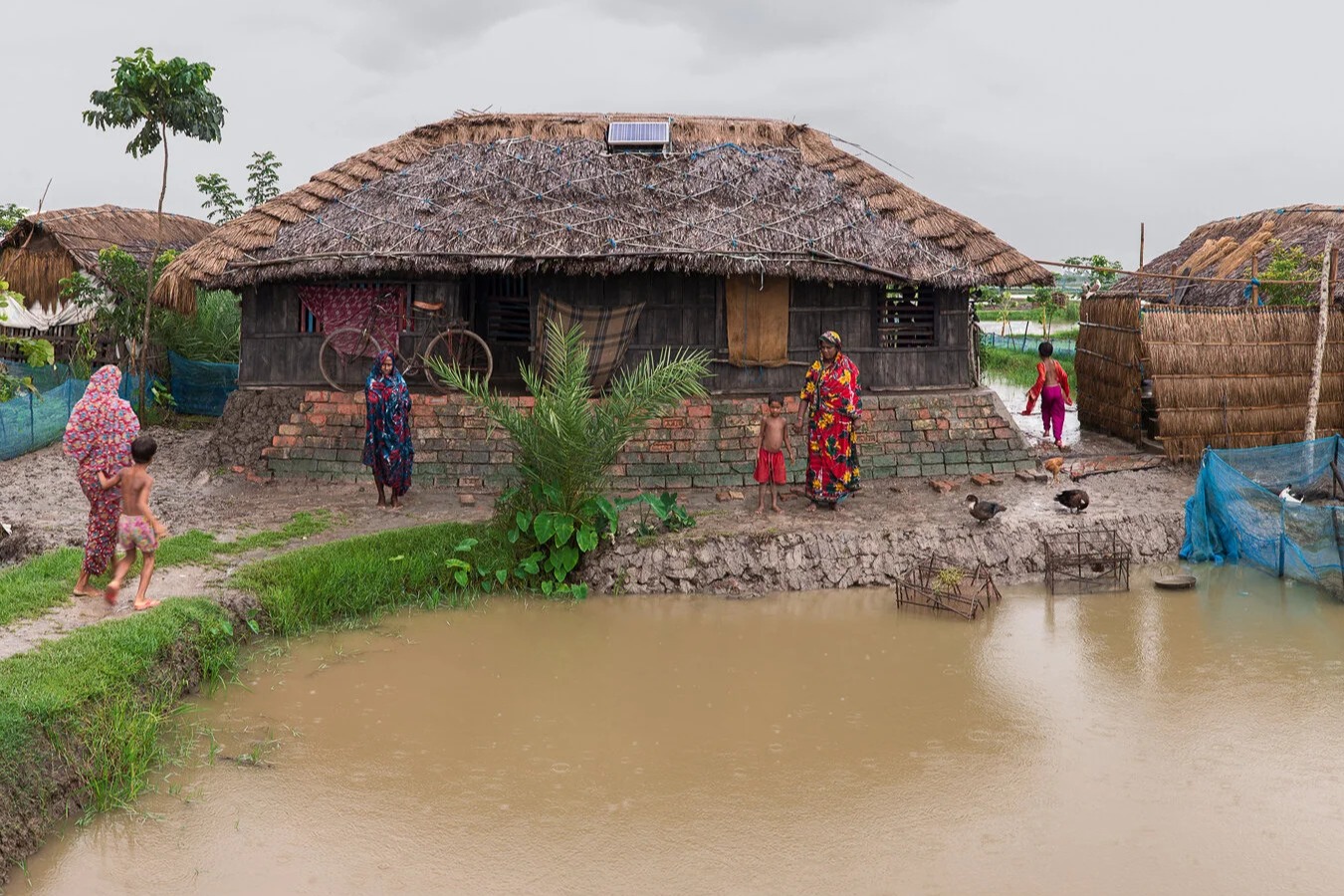Master of Science in Environmental Resilience

Why Pursue a Master's of Science in Environmental Resilience?
Learn how to strengthen our communities’ resilience to climate change. Gain the technical skills and interdisciplinary knowledge needed to solve problems, communicate science effectively, and build resilience. Earn a Master’s of Science in Environmental Resilience in one year at UNC Asheville.

An Interdisciplinary Curriculum
Our program prepares you for professional careers tackling the complex, interdisciplinary challenges communities face to make our environments, infrastructure, and economies more resilient to a changing climate. Your courses will include study of climate science, GIS, economics, ethics, and data science. You will complete coursework in the fall and spring semesters and conduct applied research for a community partner in the summer, earning your MS in one year.

Community-Engaged Research
During your spring semester, you’ll gain hands-on experience through an internship with an organization working on climate resilience. Community partners include the Asheville offices of the National Oceanic and Atmospheric Administration (NOAA), UNC Asheville’s own National Environmental Modeling and Analysis Center (NEMAC), and additional community-based and governmental organizations in Asheville and beyond. Through the work you embark on with your community partner, you’ll develop plans for your capstone applied research project, which you will undertake in your final summer term. Gain the skills and knowledge necessary to prepare you for a dynamic career in climate resilience.

Small, In-Person Classes
Our small, in-person classes emphasize critical and open inquiry and discussion, hands-on research, collaborative learning, and community. You will complete your degree as part of a small cohort of students, beginning together in the fall and graduating in the summer.

Local to Global
Action to build resilience to climate change transcends borders. In our program you will study how communities and governments across the world are building resilience.
Master’s Program in Environmental Resilience Welcomes First Cohort

Master’s Program in Environmental Resilience Welcomes First Cohort
See how MSER students helped Western North Carolina build back better after hurricane Helene and how they plan to address climate change through interdisciplinary learning
Curriculum
Students will take a total of 30 credit hours, across seven 3-credit hour content courses, one 3-credit hour internship-based course, and one 6-credit hour applied research practicum course.
Required Courses
-
- MSER 501: Climate Science
-
- MSER 502: Climate Resilience Foundations: Theory and Practice
-
- MSER 503: Introduction to GIS
-
- MSER 510: Advanced GIS
-
- MSER 511: Practicum I: Internship and Research Proposal
-
- MSER 599: Practicum II: Applied Research Project
Elective Courses
-
- (students will take 3 elective courses from this list, which will be offered on a rotating basis)
-
- MSER 521: Visualizing and Communicating Data
-
- MSER 522: Economics and Finance of Climate Resilience
-
- MSER 523: Social and Ethical Dimensions of Resilience Planning
-
- MSER 524: Regression and Predictive Modeling
-
- MSER 525: Monitoring and Evaluation
Sample Schedule
Fall
- MSER 501: Climate Science
- MSER 502: Climate Resilience Foundations: Theory and Practice
- MSER 503: Introduction to GIS
- MSER 521: Visualizing and Communicating Data
Spring
- MSER 510: Advanced GIS
- MSER 511: Practicum I: Internship and Research Proposal
- MSER 524: Regression and Predictive Modeling
- MSER 522: Economics and Finance of Climate Resilience
Summer
- MSER 599: Practicum II: Applied Research Project
Course Descriptions
An introduction to what is known about Earth’s climate system and its interactions with natural systems. Additionally, we will dig into the science of climate change and assess the utility of various climate models for future projections of climate. Students will gain skills in practical applications of climate data and how to best communicate those results to a diverse set of stakeholders.
An introduction to both the theory and practice of climate resilience. Course covers frameworks for conceptualizing exposure, risk, vulnerability, adaptation, and resilience; theory and evidence of disproportionate impacts; and the principles, components, and strategies for building climate resilience plans. This course draws upon the US Climate Resilience Toolkit’s Steps to Resilience framework.
This course will introduce students to the field of Geographic Information Systems (GIS) and demonstrate its applications to the fields of climate science, community resilience, and risk and vulnerability. Through a series of lectures, case-studies, and computer lab exercises, students will gain an understanding of basic GIS principles, data exploration, and geospatial analysis. Students will learn to use a variety of software platforms, including ArcGIS Online, ArcGIS Desktop, QGIS, among others to integrate and incorporate climate, resilience, and natural hazard datasets into GIS for further evaluation and analysis. Students will also be introduced to basic geospatial communication and learn how to create static and interactive maps, online GIS web viewers, Dashboards, and StoryMaps to convey complex data. Upon completion of the course, students should feel comfortable using GIS tools to explore spatial data, perform simple analyses, and communicate climate and resilience information to end-users, decision-makers, and other stakeholders.
This course will deepen student’s skills learned in the intro GIS course and cover a range of advanced topics, such as detailed geospatial analysis, raster analysis and modeling, network analysis, Python automation, and resilience assessments. Students will become more familiar with data scale and data sources, learning how to select the best climate data for a project’s needs, and will be introduced to downscaled and gridded data. They will gain hands-on experience working with GIS-based climate data to better understand future climate projections and scenarios. This course will also introduce climate and vulnerability assessments. Students will become familiar with the Steps to Resilience process, utilizing GIS tools and analyses to identify people and community assets most vulnerable to a changing climate, as well as how to quantify, visualize, and communicate the concepts of exposure, adaptive capacity, vulnerability, and risk.
To gain practical experience in the field of climate resilience, students will complete an internship with a community partner (governmental, non-profit, or for-profit organization). As part of the practicum experience, students will also work with the MSER course instructor and their host organization to develop a proposal for an applied research project, to be completed in the following Summer.
This course applies principles from Human-Computer Interaction (HCI) and information visualization to the design of interactive data tools and systems. Through hands-on projects, case studies, and research papers, students will explore the effectiveness of data systems in environmental planning from multiple perspectives. Students will learn how to select between different visual displays of information; assess the usability and effectiveness of data interfaces; communicate data insights through clear, compelling narratives; and understand the possibilities and challenges of using interactive data tools to inform public planning.
This course focuses on understanding how economic and financial theories and tools can be applied to enhance societal and environmental resilience to climate impacts. Course covers the economic implications of climate risk, risk assessment and management, weather and climate insurance, environmental valuation for cost-benefit analysis, carbon pricing and trading schemes, the circular economy, and the economics of digital technology and infrastructure for climate resilience.
Students learn to identify ethical and social aims of resilience planning in various contexts and to evaluate metrics for alignment with public values. Assigned materials will introduce core concepts and vocabulary in ethical reasoning and how these apply to value commitments in resilience planning: fairness, freedom, safety and security, equal access to information and emergency response, and community well-being. Students complete an individualized project with a stakeholder analysis that includes a vulnerability assessment and a proposed set of ethically sensitive and informed resilience metrics.
In this course we cover linear models in matrix notations and multiple linear regression models. Distribution results, categorical predictors, interactions, connection to ANOVA, sums of squares, diagnostics, remedial methods of common violation of model assumptions, and ridge and nonparametric regression will be discussed. Students will learn to understand the structure of linear regression models in theory, distinguish between regression and ANOVA models, identify the appropriate model for real-data analysis, and implement and correctly interpret real-data analysis with software.
Interest in evidence-based policy and programming has become widespread in numerous sectors, including public health, education, economic development, and environmental policy. Generation of this evidence requires that those implementing social policies and programs engage in monitoring and evaluation to identify and understand their impacts. This course covers the dominant frameworks and tools used in monitoring and evaluation; the art and science of causal inference; and the experimental, quasi-experimental, and mixed methods used in impact evaluation, with specific applications to evaluating the impacts of interventions designed to build climate resilience.
Students will complete an applied research project that serves the climate resilience information needs of a community partner.
Tuition & Financial Aid
Student loans are available to graduate students who complete the FAFSA. For more information about completing the FAFSA and applying for student loans, click here.
For questions about applying for student loans, contact UNCA’s Office of Financial Aid at finaid@unca.edu or 828-251-6535.
| Fall 2025 | Spring 2026 | Summer 2026 | TOTAL | |
| In-State Tuition and Fees | $4,146.50 | $4,146.50 | $2,775.17* | $11,068.17* |
| Out-Of-State Tuition and Fees | $12,307.50 | $12,307.50 | $8,215.85* | $32,830.85* |
How to Apply
UNC Asheville invites applications to the Master of Science in Environmental Resilience (MSER) Program from individuals committed to an intensive, interdisciplinary study within a liberal arts setting. Admission is open to all who hold a bachelor’s degree (or equivalent) in any field and demonstrate a clear interest in advanced studies in climate resilience.
Applicants should have completed the following three undergraduate prerequisite courses
- An introductory natural science course in a relevant field (i.e., Atmospheric Science, Chemistry, Environmental Science/Studies, or Physics)
- An introductory course in Economics
- An introductory course in Statistics
Applicants missing one of the prerequisites may complete it during the fall semester.
Prospective graduate students must have completed a Bachelor’s degree from an accredited college or university. Overall undergraduate GPA must be 3.0 or higher.
Application Materials
- Official transcripts from all institutions attended (including credit and withdrawals)
- Two letters of recommendation
- A resume
- A 500-1000 word essay detailing your academic background, professional goals, and how the MSER program aligns with your personal and career objectives. The essay should also highlight unique skills, personal qualities, or relevant experiences you bring to the program.
- A non-refundable application fee of $75
Optional: Apply for North Carolina Residency through the NC Residency Determination Service (RDS), at https://www.ncresidency.org/ and submit your RCN as part of your application
Begin your application via the MSER Application Portal here.
The committee will begin reviewing complete applications on March 2, 2026. After that, complete applications will be reviewed on a space-available basis.
Note that all MSER students enroll as full-time, in-person students and we do not accept applications for part-time status at this time.
We encourage you to apply for financial aid (see below) at the same time you submit your application. You do not need to wait for an admissions decision to apply for financial aid.
At this time, UNC Asheville is not able to provide F-1 sponsorship for international students for this graduate program. Once we are able to do so, we will list updates with specific international graduate admission requirements.
Students applying from other countries or whose native language is not English must submit English proficiency exam scores from one of the following to admissions@unca.edu:
- Test of English as a Foreign Language (TOEFL) minimum score considered: 550 on paper-based test and 80 on the Internet-based test. The UNC Asheville code is 5013.
- International English Language Testing System (IELTS) minimum score considered: 6.5
- Pearson PTEA minimum score considered: 53
- Duolingo English Test (DET) minimum score considered: 105
Our Faculty
Actively drawing from a wide variety of academic disciplines, faculty in UNC Asheville's Environmental Resilience Master program share their passions with students as they equip them with the knowledge and technical skills to tackle the climate resilience challenges facing our communities.
Kathleen Lawlor, Ph.D.
Director of MS in Environmental Resilience, Associate Professor of Economics
Office: 152 Karpen Hall
Phone: (828) 250-3983
Email: klawlor@unca.edu

Grace Campbell, M.L.A., Ph.D.
Assistant Professor of Political Science
Office: 220 Zagier Hall
Phone: (828) 251-6312
Email: gcampbel@unca.edu

Kedai Cheng, Ph. D.
Assistant Professor of Mathematics
Office: 313 Rhoades/Robinson Hall
Phone: 5195
Email: kcheng@unca.edu

Caitlin Crossett, Ph.D.
Assistant Professor of Atmospheric Sciences
Office: 251 Rhoades/Robinson Hall
Phone: (828) 250-3888
Email: ccrosset@unca.edu

Greg Dobson, GISP
NEMAC Director of GIS and Engagement
Office: Office: 236 Rhoades/Robinson Hall
Phone: (828) 251-6973
Email: gdobson@unca.edu

Casey King
Lecturer of Environmental Science, Director of Sustainability
Office: 006 Karpen Hall
Phone: (828) 350-4556
Email: cking10@unca.edu

Dave Michelson
NEMAC Chief Product Officer
Office: Hatch Coworking Suite 170
Phone: (828) 250-3890
Email: dmichels@unca.edu

Muhammad Nawaz, Ph.D.
Assistant Professor of Economics
Office: 153 Karpen Hall
Phone: (828) 251-6834
Email: mnawaz@unca.edu

Karin Rogers
NEMAC Director; Research Scientist
Office: 236 Rhoades/Robinson Hall
Phone: (828) 250-3892
Email: krogers@unca.edu


Related Programs
Building Climate Resilience
Unlock the potential to drive positive societal change with a Master of Science in Environmental Resilience.
Explore cutting-edge solutions to the global challenge of climate change and help communities build resilience to a changing climate.
Equip yourself with the expertise to lead the way toward a more sustainable future.
Questions?
Email Dr. Kathleen Lawlor
Director of MS in Environmental Resilience
resilience@unca.edu

